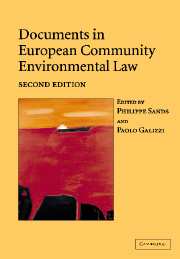Book contents
- Frontmatter
- Contents
- Preface
- PART I General principles of EC environmental law
- PART II European Community institutions and legislation
- PART III The relationship between environmental protection, financial assistance and free trade
- PART IV Procedural techniques of environmental protection
- 13 Council Directive 85/337/EEC of 27 June 1985 on the assessment of the effects of certain public and private projects on the environment (OJ L 175 05.07.1985 p. 40)
- 13A Directive 2001/42/EC of the European Parliament and of the Council of 27 June 2001 on the assessment of the effects of certain plans and programmes on the environment (OJ L 197 21.07.2001 p. 30)
- 14 Council Directive 96/61/EC of 24 September 1996 concerning integrated pollution prevention and control (OJ L 257 10.10.1996 p. 26)
- 15 Recommendation 2001/331/EC of the European Parliament and of the Council of 4 April 2001 providing for minimum criteria for environmental inspections in the Member States (OJ L 118 27.04.2001 p. 41)
- 16 Directive 2003/4/EC of the European Parliament and of the Council of 28 January 2003 on public access to environmental information and repealing Council Directive 90/313/EEC (OJ L 41 14.02.2003 p. 26)
- 17 Directive 2003/35/EC of the European Parliament and of the Council of 26 May 2003 providing for public participation in respect of the drawing up of certain plans and programmes relating to the environment and amending with regard to public participation and access to justice Council Directives 85/337/EEC and 96/61/EC (OJ L 156 25.06.2003 p. 17)
- 18 Directive 2004/35/EC of the European Parliament and of the Council of 21 April 2004 on environmental liability with regard to the prevention and remedying of environmental damage (OJ L 143 30.04.2004 p. 56)
- PART V Protection of air quality
- PART VI Biodiversity and nature conservation
- PART VII Waste
- PART VIII Dangerous substances
- PART IX Water quality
16 - Directive 2003/4/EC of the European Parliament and of the Council of 28 January 2003 on public access to environmental information and repealing Council Directive 90/313/EEC (OJ L 41 14.02.2003 p. 26)
from PART IV - Procedural techniques of environmental protection
Published online by Cambridge University Press: 06 January 2010
- Frontmatter
- Contents
- Preface
- PART I General principles of EC environmental law
- PART II European Community institutions and legislation
- PART III The relationship between environmental protection, financial assistance and free trade
- PART IV Procedural techniques of environmental protection
- 13 Council Directive 85/337/EEC of 27 June 1985 on the assessment of the effects of certain public and private projects on the environment (OJ L 175 05.07.1985 p. 40)
- 13A Directive 2001/42/EC of the European Parliament and of the Council of 27 June 2001 on the assessment of the effects of certain plans and programmes on the environment (OJ L 197 21.07.2001 p. 30)
- 14 Council Directive 96/61/EC of 24 September 1996 concerning integrated pollution prevention and control (OJ L 257 10.10.1996 p. 26)
- 15 Recommendation 2001/331/EC of the European Parliament and of the Council of 4 April 2001 providing for minimum criteria for environmental inspections in the Member States (OJ L 118 27.04.2001 p. 41)
- 16 Directive 2003/4/EC of the European Parliament and of the Council of 28 January 2003 on public access to environmental information and repealing Council Directive 90/313/EEC (OJ L 41 14.02.2003 p. 26)
- 17 Directive 2003/35/EC of the European Parliament and of the Council of 26 May 2003 providing for public participation in respect of the drawing up of certain plans and programmes relating to the environment and amending with regard to public participation and access to justice Council Directives 85/337/EEC and 96/61/EC (OJ L 156 25.06.2003 p. 17)
- 18 Directive 2004/35/EC of the European Parliament and of the Council of 21 April 2004 on environmental liability with regard to the prevention and remedying of environmental damage (OJ L 143 30.04.2004 p. 56)
- PART V Protection of air quality
- PART VI Biodiversity and nature conservation
- PART VII Waste
- PART VIII Dangerous substances
- PART IX Water quality
Summary
Editorial note
Directive 2003/4 of 28 January 2003 regulates public access to environmental information and repeals the earlier Directive 90/313/EEC of 7 June 1990 on the freedom of access to information on the environment. The objective of the Directive is to guarantee the right of access to environmental information held by or for public authorities and to ensure that environmental information is progressively made available and disseminated to the public (Article 1). ‘Environmental information’ is specifically defined by the Directive, as are the terms ‘public authority’, ‘information held by a public authority’, ‘information held for a public authority’, ‘applicant’ and ‘public’ (Article 2). Member States are to ensure that public authorities make available environmental information held by, or for, them to any applicant without him having to state his interest. Information is to be made available as soon as possible or, at the latest, within one month of the applicant's request or within two months in case of complex requests. Information is to be made available in the format requested by the applicant, with some exceptions. Member States are required to ensure that public authorities and the public are adequately informed of their rights under the Directive (Article 3).
The Directive lists a series of exceptions to the right to access information and states that grounds for refusal are to be interpreted in a restrictive way (Article 4). If possible, information is to be made available in part where it is possible to separate out any information which cannot be disclosed (Article 4(4)).
- Type
- Chapter
- Information
- Documents in European Community Environmental Law , pp. 344 - 356Publisher: Cambridge University PressPrint publication year: 2006
- 19
- Cited by



